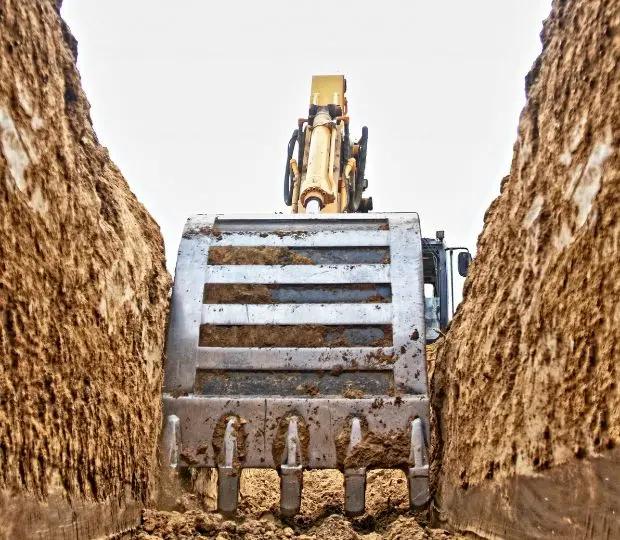Trench collapses are among the most dangerous accidents on construction sites, often resulting in serious injuries or fatalities. The law firm of Arye, Lustig & Sassower, P.C., understands the devastating impact these accidents can have on workers and their families. Our experienced trench collapse lawyers are committed to providing victims and their families with the experienced legal representation they need to navigate these complex cases.

A trench collapse occurs when the walls of a trench or excavation site cave in or collapse, potentially burying workers under several tons of soil. This type of accident is one of the most hazardous situations in the construction and excavation fields due to the sheer weight and pressure of the soil, which can cause severe injuries or fatalities to those caught in the collapse.
Trenches are often dug to lay pipes, install foundations, or other sub-surface construction activities. Despite strict safety regulations and guidelines set forth by organizations such as the Occupational Safety and Health Administration (OSHA), trench collapses still occur, primarily due to:
Victims of trench collapses often suffer from crush injuries, asphyxiation, broken bones, and traumatic brain injuries, among other serious conditions. Given the high risk of severe injury or death, trench safety is a critical concern in the construction industry, emphasizing the need for strict adherence to safety standards and practices.
Trench collapses are among the most dangerous accidents on construction sites, especially in densely populated urban areas like New York City, where construction and excavation work is prevalent. The injuries resulting from trench collapses are often severe due to the immense weight and pressure of the soil. Here are some common injuries associated with trench collapses in NYC:
Workers can be buried under several tons of soil when a trench collapses, cutting off their oxygen supply. This can lead to suffocation or asphyxiation, one of the most immediate and life-threatening risks of trench collapses.
The weight of the soil can crush the body, leading to broken bones, internal organ damage, and spinal injuries. Crush injuries often require emergency medical attention and can result in long-term or permanent disability.
The impact of a trench collapse can cause traumatic brain injuries, ranging from mild concussions to severe brain damage. TBIs can affect cognitive function, physical abilities, and emotional health.
Spinal cord injuries can occur when the spine is compressed or severed by the force of collapsing soil. These injuries can lead to partial or complete paralysis, significantly impacting a victim's quality of life.
Survivors of trench collapses may experience PTSD, a mental health condition triggered by witnessing or experiencing a traumatic event. Symptoms can include flashbacks, nightmares, severe anxiety, and uncontrollable thoughts about the incident.
This condition occurs when there's a significant increase in pressure within the muscle compartments, often due to swelling from crush injuries. It can lead to muscle and nerve damage and may require surgical intervention to relieve pressure.
Given the severe and often life-altering nature of these injuries, it's crucial for construction workers and their employers in NYC to strictly adhere to safety regulations and best practices for trench work. This includes proper trench protective systems, regular safety inspections, and immediate access to emergency medical services. Legal recourse may be available for those affected by a trench collapse to address the physical, emotional, and financial burdens resulting from such catastrophic events.
If you or a loved one has been injured in a trench collapse in New York City, taking immediate and appropriate actions can significantly impact your health, recovery, and legal rights. Here's what you should do:
Prioritize health and safety above all. Even if injuries seem minor, internal injuries can be life-threatening and may not show immediate symptoms. Ensure you or your loved one receives a comprehensive medical evaluation and follow all recommended treatments.
Ensure the accident is reported to the employer or site supervisor immediately. This is a crucial step for documentation and may be required for any workers' compensation claim.
If possible, document the accident scene, including photos of the trench and any protective systems (or lack thereof) in place. Collect contact information from witnesses and record everything related to the accident and subsequent injuries.
Keep any personal belongings and equipment affected by the collapse untouched when possible. These items can serve as evidence in your case.
Adhere to all prescribed medical treatments and attend all follow-up appointments. This not only aids in recovery but also provides a documented trail of your injuries and response to treatment, which is crucial for any legal claims.
Contact a lawyer who specializes in construction accidents. An experienced attorney can provide critical advice, help navigate the complexities of workers' compensation and personal injury laws, and protect your rights.
Insurance companies may contact you or your loved one for statements or settlement offers. It's essential not to discuss the accident or agree to any settlements without first consulting with your attorney.
In New York, you may be entitled to workers' compensation benefits, and depending on the circumstances, you may also have grounds for a personal injury lawsuit against responsible parties other than your employer. An experienced attorney can help you understand and navigate these legal options.
Avoid posting about the accident or injuries on social media platforms. Statements made online can potentially be used against you in your legal case.
During this challenging time, lean on your support system of family, friends, and professionals who can provide emotional and practical support.
The aftermath of a trench collapse can be overwhelming and fraught with legal complexities. These steps can help protect your health, well-being, and legal rights. Arye, Lustig & Sassower, P.C., has a team of experienced construction accident lawyers who understand the intricacies of trench collapse cases in NYC. We're here to help guide you through the legal process and fight for the compensation and justice you deserve. Contact us for a free consultation to explore your options.
Experience in Construction Law: With decades of experience in construction accident law, our team deeply understands the regulations and standards governing trench work. We know how to investigate trench collapse incidents thoroughly to identify violations of Occupational Safety and Health Administration (OSHA) standards and other safety regulations, including Labor Law 240(1) and 241(6).
Our approach goes beyond simply handling your case. We offer comprehensive support, guiding you through the legal process, from initial consultation to settlement or trial. We handle all aspects of your case, including gathering evidence, consulting with experts, and negotiating with insurance companies so you can focus on recovery.
Trench collapse accidents can lead to significant physical, emotional, and financial burdens. Our personal injury lawyers are skilled at accurately assessing the full extent of your damages and fighting for the compensation you deserve. This includes medical expenses, lost wages, pain and suffering, and, in tragic cases, wrongful death claims.
At Arye, Lustig & Sassower, P.C., we treat our clients like family. We understand your challenges and provide personalized attention and compassion every step of the way. We aim to make the legal process as stress-free as possible for you and your loved ones.
If you or a loved one has been injured in a trench collapse, don't face this challenging time alone. Contact Arye, Lustig & Sassower, P.C., to schedule a free consultation. Let our experienced trench collapse lawyers fight for the justice and compensation you deserve.

Attorney Advertising | Prior results do not guarantee a similar outcome. The information on this website is for general information purposes only. Nothing on this site should be taken as legal advice for any individual case or situation. This information is not intended to create, and receipt or viewing does not constitute, an attorney-client relationship. This site is protected by reCAPTCHA and the Google Privacy Policy and Terms of Service apply.